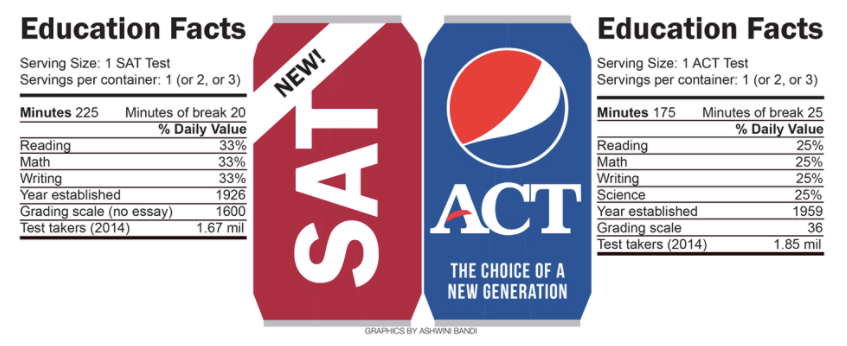Why Ignoring the ACT Could Be the Biggest Mistake in Your College Plan
- Chandrika Mukhopadhyay

- Nov 21, 2025
- 3 min read

For decades, students aiming for US colleges have felt the immense pressure of standardized testing. While the SAT often dominates the conversation, its counterpart, the ACT (American College Testing), remains a powerful and equally accepted alternative.
The reality is that both tests are universally used by admissions offices and for merit-based scholarships, and most colleges do not express a preference for one over the other. The key is that they assess college readiness using two distinct styles.
The SAT, now administered digitally, focuses on in-depth analysis and complex problem-solving across its Reading & Writing and Math sections, often requiring students to interpret long passages and apply multi-step reasoning. The ACT, on the other hand, is a paper-based test that tends to test a broader array of high school content in a more rapid-fire sequence.
Choosing between the SAT and ACT
Choosing the right test is not about which one is inherently easier, but which one aligns better with your cognitive style, knowledge base, and test-taking preferences. By understanding the core differences, students can strategically select the exam that provides their most competitive score, transforming the test from a hurdle into an advantage. This analysis offers a neutral and educational perspective on the ACT and why it may be your superior option.
While both exams assess high school learning to determine college readiness, their format, timing, and content emphasis create two distinct testing experiences.
Differences in scoring and pattern
Understanding these differences is crucial for making an informed choice. The SAT, scored on a scale of 400–1600, emphasizes critical reasoning and is structured into two main modules: one for Reading and Writing, and one for Math.
The ACT, scored on a scale of 1–36, is divided into four main sections: English, Math, Reading, and the unique Science Reasoning section, which is absent from the SAT.
This science component is not a test of specialized biology or chemistry facts, but rather assesses your ability to interpret charts, graphs, and experimental data—a critical thinking skill essential for success in university-level STEM fields. Furthermore, the ACT covers a slightly broader spectrum of math than the SAT, explicitly including concepts from Trigonometry and Probability & Statistics that appear less frequently or not at all on the digital SAT.
Differences in time pressure
The key differentiating factor for most students is time pressure. The ACT is significantly faster than the SAT.
While the total testing time is slightly longer (2 hours and 55 minutes vs. the SAT's 2 hours and 14 minutes for the non-essay versions), the ACT has a greater number of questions, resulting in far less time per question across all sections.
For example, students typically have less than 50 seconds per question on the ACT English section, demanding efficiency and quick content recall. Conversely, the SAT allows for generally more time per question, rewarding students who can invest time in deeper analysis and careful reasoning. This difference in pacing means students must honestly assess how they perform under tight time constraints.
Who benefits from the ACT over the SAT?
The structure of the ACT naturally favors certain types of students. Recognizing these profiles can quickly indicate whether the ACT is a smarter alternative for you.
Firstly, the Science and Data Analyst: Students who excel at interpreting data, analyzing graphs, and making logical inferences from figures will find the Science Reasoning section to be a score-booster. If you thrive in lab reports or data analysis exercises, the ACT plays directly to these strengths, offering an entire section where you can perform well without needing to memorize scientific terminology.
Secondly, The Speed Demon: Since the ACT rewards speed, students who are consistently fast test-takers will find they have ample time to complete the questions, minimizing the pressure that trips up others. The ACT questions often test straightforward content recall and direct application rather than the multi-step, complex reasoning often required by the SAT. If you prefer rapid-fire problem-solving over extensive deliberation, the ACT structure is built for you.
Finally, The Math Wizard: Students who have already completed or are comfortable with Trigonometry and advanced Algebra will appreciate that the ACT allows calculator use on all math questions and explicitly tests these higher-level concepts. For these students, the ACT math section is a direct assessment of classroom mastery.
Final thoughts: which one should you pick?
Ultimately, the ACT functions as a measure of achievement—how well you mastered high school content—whereas the SAT leans slightly toward a measure of aptitude and complex problem-solving. Neither is better; they are just different.
Choosing your ideal standardized test is not a guess; it is a data-driven decision. The most definitive piece of advice for any student is to take one full-length, timed practice test for both the ACT and the SAT. You can also have our experts evaluate your academic interest and profile focus, recommending which test gives you the best chance of scoring well and succeeding in admissions!




Comments